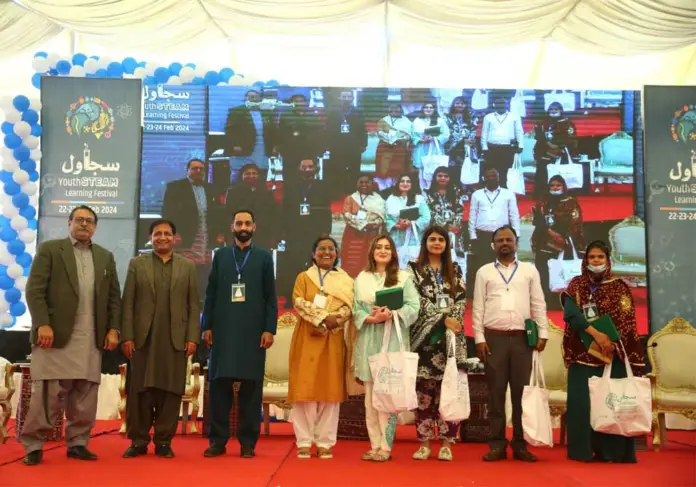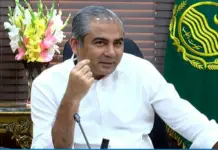More than 12000 students from over fifty government and private schools and science enthusiasts visited the three-day Sujawal STEAM Learning Festival that concluded at the Govt Boys High School Ground in Sujawal, a district in Sindh’s Banbhore Division.
It is pertinent to mention that STEAM Education is an approach to learning that uses science, technology, engineering, the arts and mathematics. The festival was jointly organized by the Sindh Education and Literacy Department, Thar Education Alliance (TEA), Reform Support Unit (RSU) and the UN International Children’s Emergency Fund (UNICEF).
“We are happy to announce here that this is the largest science festival held for the first time in Sujawal,” Partab Shivani from Thar Education Alliance, Mujeeb Khatti from the Reform Support Unit and Tooba Noor from UNICEF said. “This is a very important event to familiarize school administrations, teachers and students with unique ways to teach and understand concepts in an interesting and engaging manner,” they said.
They said that it was a pleasant shock for them to see unprecedented response from students and community of Sujawal, Thatta and Badin, considered to be one of the climate-hit areas and last in district education ranking. All the students from three districts of Laar set up over 60 stalls to showcase their creative works on different themes and aspects of science.
The students expressed joy and gratitude for getting an opportunity to display their innovative science models. The organizers gave away awards who had clinched top three positions in the festival. In a panel discussion on climate change and its impact on education in emergencies, Munawar Memon – a speaker – emphasized that climate change was not a recent phenomenon; but the globe has been witnessing its impact for a century.
However, “the present situation is markedly different. Most people are actively contributing to the destruction of the nature and resources while merely trying to sustain their lives,” he said, adding that the individual efforts can play a pivotal role in mitigating climate change, starting from one’s home and potentially influencing the broader context of a country.
Akif Sattar from the Malala Fund stated that it’s the age of information and adaptation. “When discussing disasters, they are not merely natural but often man-made. In this tech era, we must embrace new ways and approaches,” he said, adding that introducing resilient practices and positive behavior can contribute to the betterment of environment. “When you translate your learnings into action, it will undoubtedly create a significant impact.”
Abbas Khoso mentioned that the climate change debate gained prominence after the 2010 flood, and the recent flood in 2022 disrupted the education system. He said that numerous schools were directly or indirectly damaged. In cases where some schools remained intact, internally displaced persons (IDPs) found refuge there for safety, he pointed out. He also said that there was a lack of studies providing data on how many children were able to resume their education after these emergencies.
Muhammad Khan expressed that Sujawal, Badin, and Thatta remained affected areas with a majority of the population bearing the impact. He said that records and ground realities over the years show a consistent situation here. “Seven out of 14 tehsils in these three districts are directly connected with the sea,” he said, and added the community suffers from this hazardous environment due to local policies. Over the past 25 years, he said that numerous villages have been forced to migrate, leaving their homes.
“When disasters strike these areas, the damage to education is extensive. Although, we may design plans for the retention of children in schools, the challenges in this region persist every alternate year.” During the closing ceremony, Deputy Commissioner Abdul Wajid Shaikh expressed his surprise at the abundance of talent and enthusiasm for STEAM learning approaches, and mentioned that he hadn’t expected such a vibrant community. He declared that the local administration will host similar festivals in the future, aiming to provide exposure and opportunities for the children of nearby areas.







